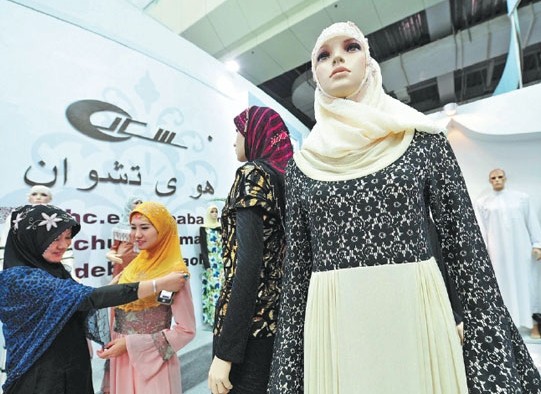

Islamic garments are shown at the China-Arab States Expo in Yinchuan, Ningxia Hui autonomous region. About 35 percent of the Ningxia population is of the Hui ethnic group, which has many affinities with Arab states. Peng Zhaozhi / Xinhua
Hui region to capitalize on Islamic cooperation
Northwest China's Ningxia Hui autonomous region is asking the national legislature to let it streamline approval procedures to attract financial institutions from the Arab world to invest in Ningxia.
Ma Li, mayor of the autonomous region's capital city of Yinchuan, said local authorities are striving to create a model for financial cooperation between China and Arab nations.
He suggested introducing a "green channel" for investors from Arab nations, especially sovereign funds.
He also proposed the establishment of a development bank, in partnership with Arab nations, to promote the development of western China.
Further, he suggested establishing jointly invested financial institutions, including brokerages.
Other parts of his proposal cover financial outsourcing services and increased use of the yuan in trading and settling accounts.
"Trade between China and Arab nations has surpassed $200 billion annually, yet cooperation in the financial field is limited," Ma said.
"Financial cooperation will elevate the quality of our trade, boost bilateral investment and provide mutual value." He added that his proposed moves can drive Ningxia, an inland region, to open up fully, as well as creating more financial support for local and traditional industries.
About 35 percent of the Ningxia population is of the Hui ethnic group, which has many affinities with Arab nations. Those similarities are of benefit in communication.
Yuan Jinlin, a senior official with Ningxia's reform and development commission, said that the inland region lags behind its counterparts - not only because it has a less developed economic foundation but also fewer ways to open up to the world.
In recent years, many State- and regional-level forums and fairs, such as the China-Arab States Expo, have been held in Ningxia.
In 2009, Ningxia gained approval to be one of the first areas in the nation to operate Islamic banking services.
Lu Zhengwei, chief economist of Industrial Bank Co, believes that as China is seeking to strengthen its bonds with the Arab world and develop its own western regions, Ningxia could play an important role.
But it should be noted that Islamic banking (Sharia-compliant finance) has unique characteristics that forbid interest. Rather, profits must be derived from service fees and dividends, he said.
Zhao Lei, a professor from the CPC Central Committee Party School, said that 45 to 60 percent of trade transactions around the world are generated between regional organizations, which suggests Ma's proposals have bright prospects.
He advised that Ningxia should take full account of demand and resource complementarities between the partners.
Also, he warned that "not every country from the Arab world is suitable for establishing cooperation."
Copyright ©1999-2018
Chinanews.com. All rights reserved.
Reproduction in whole or in part without permission is prohibited.